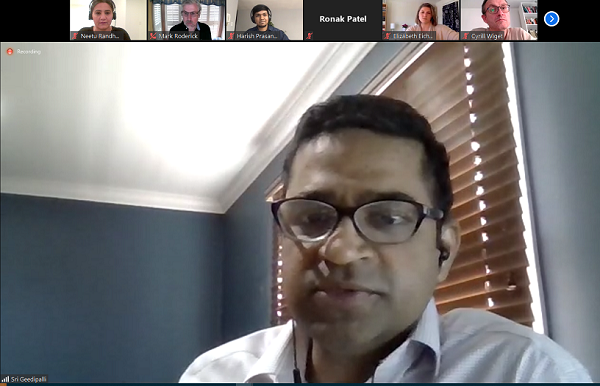Consider Equity Crowdfunding to Support Your Startups, Panelists Say at April TiE NJ Meeting
The ins and outs of crowdfunding were discussed at a virtual TiE New Jersey meeting on April 22. Panelists representing both the investor and startup side of the investment equation discussed both rewards-based and equity-based crowdfunding. They said that these methods could be good alternatives for startups seeking to raise funds during the COVID-19 economic crisis.
Featured at the meeting were Elizabeth Eichhorn, startup coach with IFundWomen (New York), a platform for early-stage entrepreneurs that helps women get funding through crowdfunding; Mark Roderick, principal partner at Lex Nova Law (Cherry Hill), who spends all his time in the crowdfunding and fintech space; Harish Prasanna, cofounder and CEO of OpenAVN (New York), which has a decentralized antivirus solution, and whose founders did a big round through crowdfunding; and Vijar Kohli, cofounder and group CEO at Golden Door Asset Management (Newark). Kohli has been involved with some successful crowdfunding campaigns.
The online event was moderated by Srinath Geedipalli, managing director at Simanor (New York), which provides strategic advisory services on mergers and acquisitions and other specialties to middle-market companies in the U.S. and India.
Crowdfunding Basics
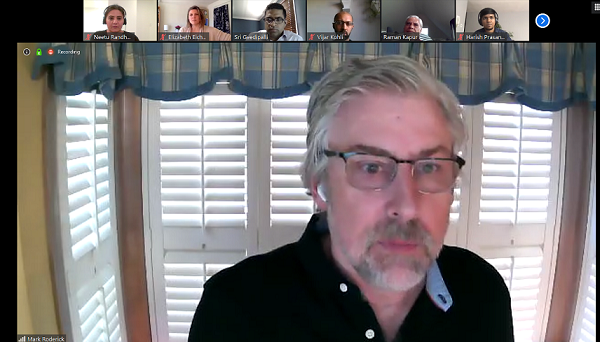
Roderick kicked off the meeting by distinguishing between investment-grade crowdfunding and the crowdfunding that happens on Kickstarter and other platforms. “You’re not offering baseball caps when you raise money. You are offering some kind of return, just as you would in the paper world. You are issuing stock, or you are issuing notes, or revenue-sharing notes, or preferred stock or convertible debt or something, some investment.”
The Jumpstart Our Business Startups (JOBS) Act, signed by President Obama, made investment-grade crowdfunding possible and introduced advertising into the mix, Roderick noted. It used to be illegal for startups to advertise when they were raising money for private entity, he said.
“This was a basic fundamental concept of American securities laws, and had been since 1933. That’s what the JOBS Act changed … the huge difference between the old world and the new world is that you can advertise. … And in some of the kinds [of crowdfunding] there are some restrictions on advertising. But there are other kinds where there is no restriction whatsoever.”
Equity crowdfunding is very different from raising money from angels or VCs, he pointed out, because startups don’t have a personal relationship with their funders. “The nature of the beast is you’re raising money from strangers. You’re raising money without a personal touch. You’re raising money, by and large, from relatively unsophisticated investors … who bring nothing to the table but money.” That’s opposed to investors who are angels or VCs, in which case “you’re raising money from people that you expect to bring more to the table,” such as relationships and expertise.
On the flip side, the crowd doesn’t expect very much of you, he said. Besides expecting you to make money for them, the crowd “doesn’t expect to play any role in management. … The crowd doesn’t think it ever has the right to kick you out of your company. The crowd doesn’t look over your shoulder when you’re making a quarterly forecast.”
Focusing on Female Entrepreneurs
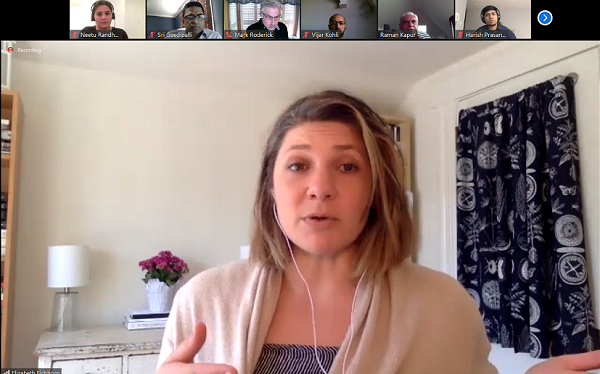
Eichhorn spoke about a food production company that she had launched years ago through Kickstarter. She noted that in 2012 the only options for funding were to crowdfund, bootstrap or go into debt by maxing out a credit card or getting a loan, which she probably couldn’t have qualified for. Kickstarter gave her the opportunity to raise enough money to launch a new product. But there were still hurdles for the young entrepreneur. For example, she didn’t understand how much shipping and packaging would eat into her profits.
Eichhorn said that after learning more about Kickstarter, she began to understand that the rate of success is low on that platform and that female entrepreneurs have an even lower rate of success. “The rate of food entrepreneurs is astronomically low,” she said. But she did it. And, “I still had my entire company. I still got to make every decision.” When you take investment from angels or VCs, you answer to your investors, she pointed out.
“Fast forward to where we are now,” said Eichhorn. “I work for a company that is a rewards-based crowdfunding platform that is focused more on female entrepreneurs. Female entrepreneurs still don’t have the funding, or the opportunities, to get funding for their company.”
IFundWomen helps female entrepreneurs overcome those hurdles by helping them to use crowdfunding to market their ideas and their products. “They can utilize crowdfunding in a way where you can actually test your audience before you launch the entire product into the world and spend all of this money in capital, where maybe it’s something that … the audience doesn’t really want.”
OpenAVN Uses SeedInvest
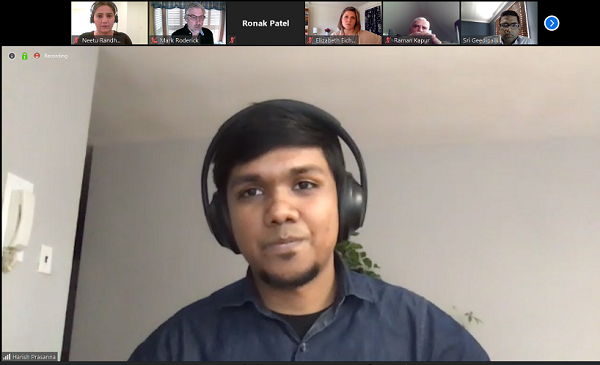
According to Prasanna, OpenAVN is a decentralized blockchain-based malware and digital threat-mitigation platform that can immunize customers against threats in three to five days, which is quick in this industry. The company had considered doing an initial coin offering (ICO), but since that was not approved by the SEC at the time, it backed away. After OpenAVN had raised about $250,000 from friends and family and had a product in the market, SeedInvest (New York), an equity crowdfunding platform, invited company to raise funds via its platform. This was a big challenge to the startup because SeedInvest selects 10,000 companies for its platform, but only 1 percent are successful. Prasanna said that OpenAVN wanted to show the world that ICOs weren’t the only way blockchain companies could raise funds.
The road to raising funds was not easy, Prasanna said. SeedInvest took the company out on road shows. “We were in at least seven different hackathons. …These were avenues for us to prove that we are a company, that we have come up with a product and we had the chops to be out there.” The crowdfunding campaign and the roadshows were the “tools we used to market our firm, and we successfully raised about $410,000.”
This fundraising legitimized the company and set the stage for the startup to attract other investors. After it had obtained the initial sum, OpenAVN raised another $1.5 million from traditional investors, Prasanna said.
Kohli Sees Advantages to Equity Crowdfunding
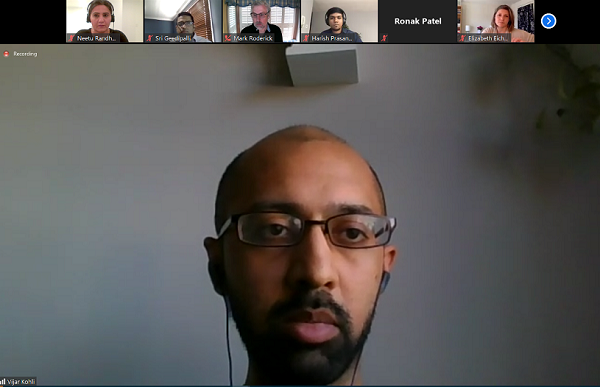
Vijar Kohli said that Golden Door Asset Management doesn’t invest in companies via crowdfunding, but he had personally gotten involved in several crowdfunded startups.
One of those investments, which has been very successful, is Hacker Noon (Edwards, Colo.), an independent tech blogging platform that was listed on the StartEngine (Santa Monica, Calif.) site with a $7.5 million valuation, “comparable to “a lot of early-stage A and B round funding,” he said.
According to Kohli, people don’t realize that professional investors often invest directly through these crowdfunding platforms. “We raised quite a bit of money from VCs that invested through the platform,” he said. Overall, more than 1,200 people contributed to the $1 million the company raised. “We were very, very happy with the results because we only had to sell about 14 percent of the company,” he noted.
Kohli advised companies to consider going the crowdfunding route in preference to angel funding, especially considering today’s COVID-19 economic crisis. Crowdfunding has always been successful, its execution is straightforward and it is a very transparent way to do business, he said.
“Besides accounting and legal fees, we didn’t have any other costs or fees. You can go straight to your investor group, and say, ‘This is the platform.’ The beauty of it is you can get outside investors. In our case for Hacker Noon, we had millions of readers. We had about 75,000 people view our campaign funnel, and had 1,200 people invest. So, it’s a pretty high success rate in that sense.”

